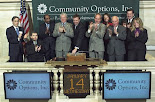
Disturbing findings in wake of 'fight club'
From the Houston Chronicle
Written by: Terri Langford
Photo Credit - Bing
Criminal fingerprint checks show at least 36 employees continued to work on the state payroll while caring for the mentally disabled — despite being arrested for felonies ranging from indecent exposure, to aggravated assault, child rape and murder.
Of those 36 with arrests, 17 had felony convictions and the remaining 19 still face trial, according to Texas Department of Aging and Disability Services records released to the Houston Chronicle Monday.
The release of the records, first requested six weeks ago, came on the eve of a House committee meeting Tuesday in which lawmakers will discuss for the first time what improvements have been made regarding care at the facilities in the wake of last year's shocking “fight club” incident in Corpus Christi.
While that's less than one percent of the 11,785 DADS employees who were fingerprinted and work at 13 State-Supported Living Centers, formerly known as state schools, the newest reform shows how pre-employment criminal background screens failed to alert the state to employees with criminal records.
Current pre-employment screening only checks for convictions in Texas. The fingerprint checks linked employees to convictions and arrests outside of Texas. Of the 17 with convictions, 13 have been terminated or resigned. The other four are still in “process” according to the agency, which released the numbers without comment.
“Of course it still matters. That amount of people has control over a handful of residents who are unable to communicate abuse or neglect or ward off that type of aggression,” said Beth Mitchell, senior managing attorney for Advocacy Inc., a group that has fought for better care of the mentally disabled in Texas. “You don't want someone like that corrupting other staff. That's what we saw in Corpus Christi. It only took one staff to corrupt a group of staff in the fight club.”
Cell phone fight videos
The incident, at what has now been renamed Corpus Christi State-Supported Living Center, was discovered by police a year ago when a lost cell phone had videos of mentally disabled residents fighting. Voices of the residents' state caretakers could be heard encouraging the residents to fight one another. Since then, four former DADS workers have been convicted as a result.
The fingerprint checks and another new reform, random drug testing — which snared 23 DADS employees who tested positive for drug use — are the only significant progress seen in the year since the cell phone video surfaced and since DADS entered into a settlement late last year with the U.S. Department of Justice.
A “baseline” report on the Corpus Christi facility, the first of 13 to be conducted on each center as part of that DOJ agreement, shows little has been done since the fight club scandal put Texas' care of the mentally disabled in the spotlight.
While the March 10 monitoring report of Corpus Christi State-Supported Living Center revealed “a number of good practices in place,” it also noted “a number of the areas in which there is a need for improvement.”
For example, in the past year, the state has yet to establish a “zero tolerance” of abuse at Corpus Christi, there are no full-time psychiatrists on staff in the Corpus facility and no standard diagnostic procedure in place for residents with psychiatric problems.
“It's pretty clear from the report that they're really far behind in meeting the criteria of the DOJ settlement,” Mitchell said.
Also, the DADS staff in Corpus has not come up with better ways to monitor the physical and nutritional needs of their residents and are not able to pinpoint those residents who are at-risk of abuse.
“The Facility is at the very beginning stages of implementing the process of screening individuals to determine if they fall into an at-risk category,” the report stated.
Documentation problems
In many areas, the monitors noted the Corpus Christi facility failed to keep proper documentation on residents. Dental care records were missing, as was proof that staff reviewed some residents' medication and allergies. The current forms being used at the Corpus Christi center failed to document residents' vocational strengths, needs or preferences.
A spokeswoman for state Rep. Patrick Rose, D-Dripping Springs, the chair of the House Committee on Human Services, said Rose would not be making any comments about the report until Tuesday's meeting. Calls to other members, including state Rep. Abel Herrero, the committee's vice chair, were not returned.
 RSS Feed
RSS Feed Twitter
Twitter































